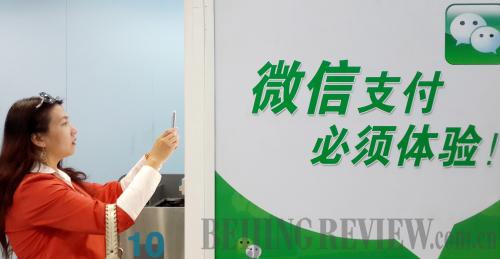
SHOPPING: A Beijing resident makes payment for a drink from a vending machine through WeChat at a Beijing subway station (LI XIN)
A Chinese app is changing the way that people, government agencies and businesses interact
Fang Cheng, an office worker in Beijing, is a self-confessed addict of WeChat, a social media platform for smartphones. Today, she not only depends on it to chat with friends, but also to discuss work and make payments.
WeChat was launched for free to users on January 21, 2011, by Tencent Inc., the founder of QQ.com, one of China's largest Internet portals. Through WeChat, users can send text, graphics, voice messages and videos without any cost; beyond that, their service provider charges for data.
In the beginning, WeChat was merely a tool to send and receive messages and share photos, yet over the years it has continued to add more and more functions.
"Shake," "Look Around" and "Drift Bottle" are features that enable users to contact strangers at random.
"With its instant speed, interactivity, and high degree of engagement, WeChat has become an emerging communication channel. It is much more than a tool for chatting," said Fang.
"Whether WeChat is valuable or not depends on what people can use it for, and what services businesses can provide for users through their public accounts," said Shen Yan, Vice President and Chief Strategy Officer of Adsit Media Technology Co. Ltd.
WeChat now has more than 600 million registered users, becoming the most used mobile application in Asia, as reported by Xinhua News Agency. Of the total users, approximately 30 percent are located outside China.
Currently, WeChat is spreading from large cities into third- and fourth-tier cities as well as to rural areas. This has triggered a surge in the number of users.
Users are not limited to individuals either. WeChat public accounts enable organizations to push feeds to subscribers, interact with subscribers and provide them with services. Government, news media and companies have used WeChat as a service and promotion platform.
As of the end of 2014, governments at various levels in China had opened more than 40,000 public accounts, a sharp rise from the number of 3,600 at the end of 2013, according to a white paper on Internet and government WeChat accounts as well as people's livelihood released by Tencent Research Institute on April 22.
Changing lifestyle
Tencent has put out a slogan WeChat is a lifestyle, with which Fang could not agree more.
In recent years, the Lucky Money application launched by Tencent on WeChat has become very popular in China. Distributing red envelopes containing money is part of tradition during the Chinese New Year. Now, through WeChat, relatives and friends can send virtual red envelopes to one another.
During the Chinese New Year celebrations of 2015, 1 million yuan ($16,129) worth of coupons to test-drive Nissan cars were distributed through WeChat. Users could get the coupons by shaking their smartphones while watching the popular Spring Festival Eve Gala of China Central Television on February 18, the Chinese New Year's eve.
Fang, from Beijing, was one of the lucky winners, winning not only a free test-drive but also 88 yuan ($14) of gift money.
She made an appointment with a Nissan dealer, went there, test drove a car, and then received the gift money.
The promotional campaign for Nissan was designed by Adsit Media Technology Co. Ltd., which also provided technical support for the initiative.
Founded in 2006, the company is a strategic partner of Tencent. Its mission is to create a total solution platform for e-commerce. During the 2015 Chinese New Year, the cloud software developed by the company has been used to distribute 378 million coupons, with a total worth of 3 billion yuan ($48.3 million).
To send or receive money on WeChat, a user must link his bank account to WeChat. A large percentage of those people distributing or grabbing red envelopes have linked their accounts to WeChat, as Fang has. Now, Fang usually makes payments with WeChat's mobile wallet feature.
















































